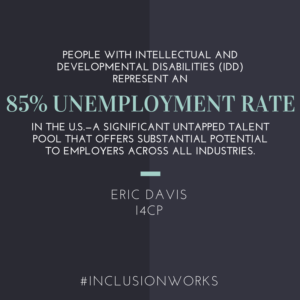The following post was authored by Eric Davis and is being shared with permission from our partner, the Institute for Corporate Productivity (i4cp)–a human capital research and data firm that discovers the people practices that drive high performance.
People with intellectual and developmental disabilities (IDD) represent an 85% unemployment rate in the U.S.—a significant untapped talent pool that offers substantial potential to employers across all industries. According to the Institute for Corporate Productivity’s (i4cp) groundbreaking study, Employing People with Intellectual and Developmental Disabilities, over a third of employers in high-performance organizations—those companies that excel in market share, revenue growth, profitability, and customer satisfaction over a five-year period—that employ people with IDD found them to be good talent matches for open positions. And three-quarters of those employers ranked their employees with IDD ranging from good to very good on most employee performance factors. Aside from their individual talents, the i4cp study found that employees with IDD also add value by absorbing tasks from other team members, boost morale and productivity, help government contractors meet Section 503 compliance quotas, and—depending on various state incentives—may qualify their employers to certain tax credits.

One major finding from the i4cp study is that concerns about hiring workers with IDD averaged 42% lower than what was actually experienced—including:
- Lack of positions with a good fit
- Need for extra supervision
- Productivity or performance issues
- Need for special supervision training
- Safety
- Need for special accommodations
In fact, only 8% of study participants overall reported a need for greater support of their IDD employees than what they experienced. This is due in large part to specialized job placement services such as Best Buddies International’s JOBs program and others listed in the resources below. When organizations partner with these placement programs, representatives visit the workplace in advance of the hires to help ascertain job suitability, help with job customization where necessary, provide training to supervisors and co-workers on effectively onboarding and working with individuals with IDD, and help get any needed accommodations in place. These representatives often continue to help through the process of onboarding, training, and coaching new hires in the workplace, plus they can offer expert guidance on any incentive programs for employing people with IDD in their state or region.
Study participants also reported that their companies benefited from introductory programs for workers with IDD, with 59% of saying they participated in programs such as on-location work trials, job shadowing, internships and/or long-term work exchanges.
i4cp’s complete report is available as a free download at http://www.ImInToHire.org.
What support do you need to move your organization towards a fully inclusive workplace that embraces all forms of disability?
Resource List
AbilityOne: The AbilityOne Program is the largest source of employment for people who are blind or have significant disabilities in the United States. More than 500 nonprofit organizations employ these individuals and provide quality products and services to the Federal Government at a fair market price.
The Arc: The Arc promotes and protects the human rights of people with intellectual and developmental disabilities and actively supports their full inclusion and participation in the community throughout their lifetimes. This site maintains links to many additional employment resources.
Association of People Supporting Employment First (APSE): A national non-profit membership organization focusing on integrated employment and career advancement opportunities for individuals with disabilities.
Best Buddies International®: A national non-profit dedicated to establishing a global volunteer movement that creates opportunities for one-to-one friendships, integrated employment and leadership development for people with intellectual and developmental disabilities (IDD).
Disability.gov: The U.S. federal government website for information on disability programs and services nationwide. This site maintains links to many additional employment resources.
Employment Alliance for People with Disabilities (EAPD): EAPD focuses on increasing employment opportunities for people with disabilities and empowering business performance by leveraging best practices in diversity and disability inclusion in the workplace, supply chain and marketplace.
Employer Assistance and Resource Network (EARN): EARN’s vision is to increase employment and workplace inclusion for people with disabilities by engaging and empowering employers to be leaders in this effort.
Easter Seals: A national non-profit organization that provides services, education, outreach, and advocacy so that people living with autism and other disabilities can live, learn, work and play in our communities. This site maintains links to many additional employment resources.
Job Accommodations Network (JAN): The leading source of free, expert, and confidential guidance on workplace accommodations and disability employment issues.
ManpowerGroup/Access2Ability: Access2Ability is ManpowerGroup’s national disability employment program, collaborating with employers, state and federal agencies, professional associations and community-based organizations to help job seekers with disabilities connect with job opportunities.
Office of Disability Employment Policy (ODEP): ODEP is a sub-cabinet level policy agency in the U.S. Department of Labor with a mission to promote the adoption of policies that will impact the employment of people with disabilities.
Project SEARCH: A business led, one-year high school-to-work transition program. Total workplace immersion facilitates a seamless combination of classroom instruction, career exploration, and hands-on training through worksite rotations. Project SEARCH’s primary objective is to secure competitive employment for people with disabilities.
RecruitDisability Job Board: Job seekers with disabilities can search for a job, post a resume, and get career news on RecruitDisability, a new job board especially for people with disabilities. Employers and recruiters can also use the site to find qualified individuals with disabilities. You can also get information about companies that are hiring now.
U.S. Business Leadership Network® (USBLN®): A national non-profit that helps business drive performance by leveraging disability inclusion in the workplace, supply chain, and marketplace.
Workforce Recruitment Program (WRP): The WRP is a recruitment and referral program—managed by U.S. Department of Labor’s Office of Disability Employment Policy (ODEP) and the U.S. Department of Defense’s Office of Diversity Management & Equal Opportunity (ODMEO)—that connects federal and private sector employers nationwide with highly motivated college students and recent graduates with disabilities who are eager to prove their abilities in the workplace through summer or permanent jobs.

Eric’s areas of expertise as an analyst are: diversity and inclusion, discrimination, minority employment trends, immigration patterns, HR trends and structures, talent acquisition, HR technology, social media, relocation, labor relations, and crime and violence in the workplace. Eric is a widely published expert on diversity and inclusion trends with over a decade of experience in the field. He received his Master’s in Journalism and Mass Communication from Marshall University in 1996.
Recent publications by Eric include articles for Diversity Executive magazine: “Grow from Within” (2012) and “Defining Inclusion Has Bottom-Line Impact” (2012). Eric is currently engaged in the launch of i4cp’s Chief Diversity Officer Board and an i4cp study being conducted in partnership with Best Buddies International on employment of those with intellectual and developmental disabilities, due for release in Q4 2014.
